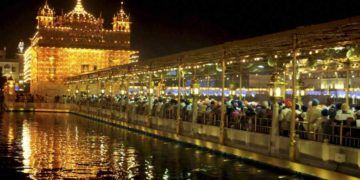by Leanne Ogasawara

1.
The sound of thousands of clattering stainless steel plates and bowls ripple across the water, as hundreds line up to enter the Golden Temple in Amritsar. Built atop a platform in the middle of a pool of water, this is the holiest shrine of the Sikh religion. Pilgrims arrive at the floating “Abode of God” walking slowly across a very crowded covered-causeway.
Just when you think nothing can be done to repair the world, you stand in awe as thousands are fed in the great communal kitchens of the temple.
The numbers are staggering. An army of volunteers show up every morning to chop vegetables, peel garlic, and fry roti. This in preparation for feeding tens of thousands every day. Known as the Langar, this communal meal is an act of charity and love, open and free to all. And what’s more, you don’t have to travel all the way to Amritsar to experience a Langar, as it is practiced in all Sikh places of worship around the world. Sitting on the ground shoulder-to-shoulder so that all are equal, pilgrims are provided with sustenance, ensuring that none leave the temple hungry.
Anyone is welcome to eat and anyone is welcome to serve.
In her beautiful book, Be My Guest: Reflections on Food, Community, and the Meaning of Generosity, Priya Basil—who herself hails from a Sikh family—feels it is a shame the meaning of the word “hospitality” in English has come to be so firmly associated with the industry of hospitality, something which has conflated acts of generosity with capitalist entertainment. And she rightly asks:
“What does this say about us when a notion that long implied giving without getting any return becomes synonymous with paying for services that promise customer satisfaction or your money back?” Read more »

